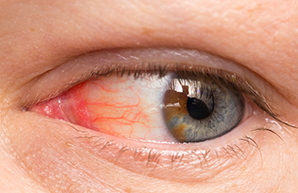1. Conjunctivitis (pink eye)
This affects the conjunctiva (tissue covering the white part of the eye) and is caused by either bacterial or viral infection, but can also be a result of allergies or a reaction to certain irritants, like chlorine. Symptoms include itchy, red eyes, burning, blurred vision, sensitivity to light, and green or white discharge from the eye. Home treatment includes applying a warm compress on the affected eye for five to 10 minutes, three to four times a day, and using non-steroidal eye drops. Note that conjunctivitis is highly contagious so avoid close contact with people until the obvious symptoms have cleared, which may take several days.
2. Eyelid bumps
These painful, red lumps affect the edge of the eyelid, and are caused by the staphylococcus bacteria (styes) or are due to a blockage in the glands of the eyelid (cysts or chalazions). Symptoms include red, watery eyes, a gritty, scratchy sensation, and sensitivity to light. Eyelid bumps don’t always require medical treatment and often clear up on their own or with basic home care, but styes that don’t drain can develop into chalazia. If you’re having trouble seeing, your eyes are extremely watery, or they hurt even in low lighting, visit your GP for an examination.
3. Keratitis
This is an infection of the cornea (the clear covering of the iris and pupil). Symptoms include red eye/s, a gritty feeling in the eye, watering, pain, blurred vision, sensitivity to light, and difficulty keeping the eyelids open. The causes can be bacterial, viral, fungal or parasitic, but it may also develop due to injury. The use of contact lenses increases the risk of developing keratitis, especially if lenses are not cleaned properly. Suspected keratitis should be treated immediately, as it can cause permanent eye damage and lead to blindness.
4. Tips to avoid infection
- If a family member or colleague has an eye infection, avoid close contact with them and wash your hands regularly.
- Read package inserts for correct usage of eye drops, and be aware of expiry dates.
- Contact lens wearers should clean and store their lenses as indicated. Wear spectacles from time to time to give your eyes a rest.
- Use safety glasses when mowing the lawn, or doing chores where your eyes may be at risk.
Consult with your Clicks pharmacist for advice and treatment options if symptoms of an eye infection develop.
IMAGE CREDIT: 123rf.com

